
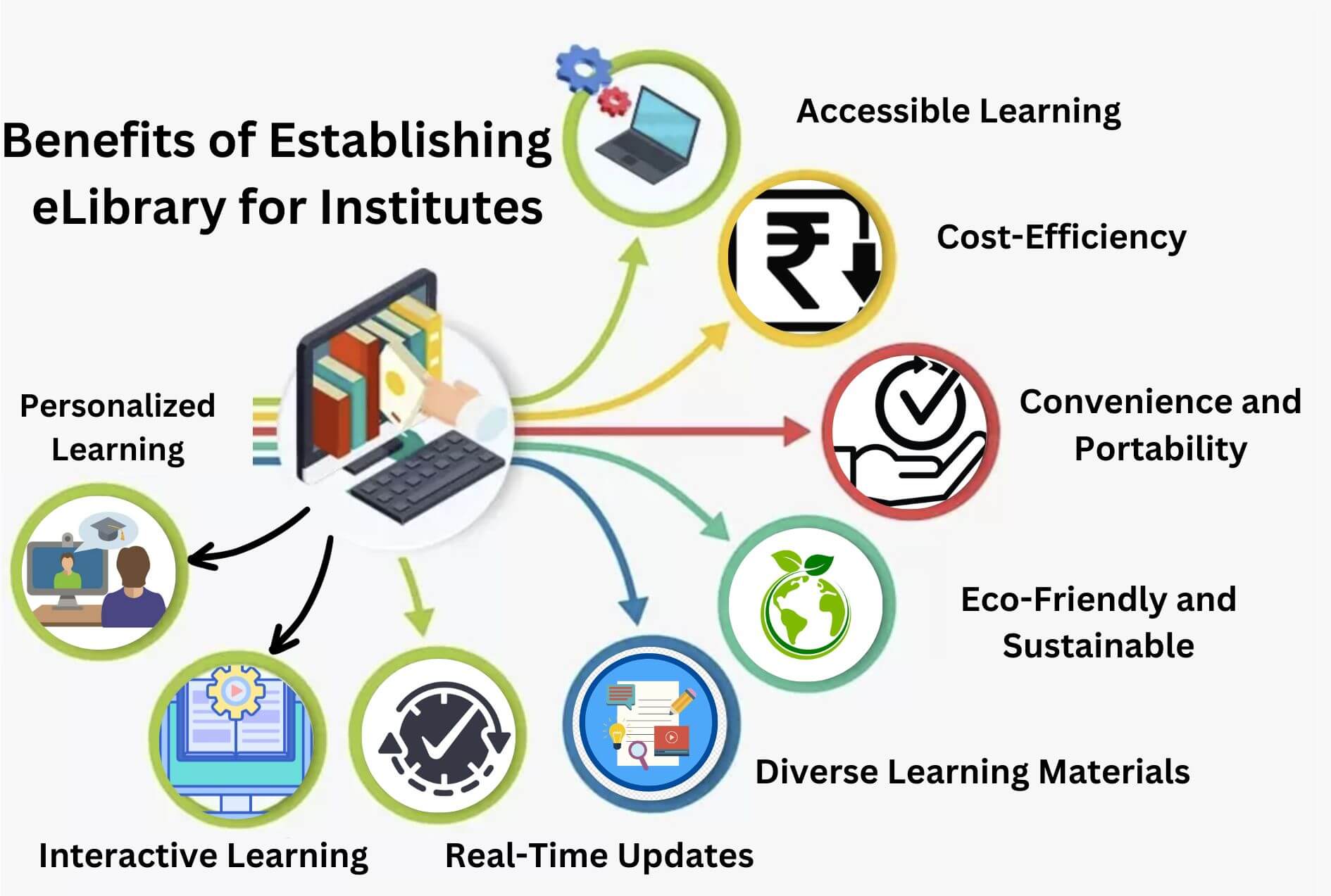
In today's rapidly evolving digital
landscape, traditional educational methods are undergoing a transformative
shift. One of the remarkable evolutions is the establishment of free eBook libraries in educational
institutes. This innovative approach to learning brings with it a bouquet of
benefits that enrich both the teaching and learning experiences. Let's delve
into the advantages of having a free eBook library for institutes.
1. Accessible Learning: The foremost benefit of a free eBook library is the democratization
of education. Students from all walks of life gain access to a wealth of
information and resources without being burdened by the costs associated with
traditional textbooks. This inclusivity promotes equitable learning, bridging
the gap between privileged and underprivileged students.
2. Cost-Efficiency: Free eBook libraries substantially reduce the financial strain on students and
their families. Physical textbooks can be prohibitively expensive, and with the
ever-rising costs of education, having a repository of free eBooks alleviates
this burden. It also eliminates the concern of outdated editions, as eBooks can
be easily updated and revised.
3. Convenience and Portability: eBooks are accessible
anytime, anywhere. Some app even give you the facility to download and read the
E book even without the internet connection. Students can carry an entire
library on their digital devices, eliminating the need for heavy backpacks
filled with books. This convenience encourages self-directed learning and
allows students to study at their own pace.
4. Eco-Friendly and Sustainable: A digital library significantly reduces the need for paper,
contributing to environmental preservation. By reducing paper consumption,
institutes can contribute to sustainable practices and instill
eco-consciousness in students, fostering a sense of responsibility towards the
planet.
5. Diverse Learning Materials: eBook libraries offer a vast array of materials beyond traditional
textbooks. Institutes can curate a diverse collection of resources, including
scholarly articles, research papers, multimedia content, and interactive
learning modules. This variety caters to different learning styles and enhances
engagement in the learning process.
6. Real-Time Updates: The digital nature of eBooks enables swift updates and revisions.
In fields like science and technology, where knowledge evolves rapidly,
institutes can ensure that students are always exposed to the latest
information. This dynamic approach enhances the quality and accuracy of the
learning materials.
7. Interactive Learning: Many eBooks come with interactive elements such as quizzes, videos,
animations, and hyperlinks to additional resources. These features transform
passive reading into an engaging and immersive learning experience. Students
can grasp complex concepts more easily through interactive visuals and
simulations.
8. Global Connectivity: Free eBook libraries break down geographical barriers. Institutes
can collaborate with experts and educators from around the world, sharing
resources and insights seamlessly. This global connectivity enriches the
educational experience, exposing students to diverse perspectives and fostering
cross-cultural understanding.
9. Personalized Learning: eBooks can be customized to suit individual learning needs.
Institutes can create tailored reading lists, suggested readings, and learning
pathways for different courses or student levels. This personalization empowers
students to take ownership of their education and pursue areas of interest.
10. Data-Driven Insights: Digital platforms allow institutes to gather data on students'
reading habits and engagement levels. This data can be leveraged to identify
trends, gauge the effectiveness of learning materials, and make informed decisions
about curriculum development.
The establishment of a free eBook library
in educational institutes leads to a new era of accessible, dynamic, sustainable
and eco friendly learning. From reducing financial barriers to enhanced global
connectivity, the benefits are manifold. By embracing digital resources,
institutes not only provide an extra means of studying and learning but also
prepare students for a world where digital literacy is a crucial skill. As
technology continues to reshape education, free eBook libraries stand strong
thus showcasing the innovative spirit of
learning institutions dedicated to shaping the future.

Are You a Publisher? Looking to Sell E-Books?
Join
the Revolution with eBooks eLibrary Today
In an increasingly digital world,
the demand for eBooks has seen exponential growth. Readers across all age groups
and professions now prefer the flexibility and accessibility of digital content
over traditional formats. Whether it's for higher education, competitive exams,
leisurely reading, or professional development, the shift to digital is
undeniable.
For publishers, this transformation
isn't just a trend, it's an opportunity. Ebooks eLibrary, a comprehensive ebooks store and ebooks
library, is offering publishers the chance to tap into this growing
market without the usual barriers. Whether you publish academic textbooks,
storybooks, or exam prep guides, Ebooks eLibrary can help you reach your
audience like never before.
Let’s dive into how you, as a
publisher, can benefit from being part of the Ebooks eLibrary platform.
Why
Go Digital with Ebooks eLibrary?
1.
No Initial Setup Cost
One of the most significant concerns
for publishers venturing into digital platforms is the upfront investment. With
Ebooks eLibrary, this worry is
eliminated. You can onboard your titles without any initial setup cost. This
removes financial risk and allows you to explore the platform without pressure.
2.
Revenue Sharing Model
Instead of fixed fees or complicated
licensing structures, Ebooks eLibrary follows a simple and transparent revenue sharing model. This ensures
that your earnings grow as your content gains popularity. This
revenue-sharing model supports long-term collaboration and sustainable growth
for publishers and the platform alike.
3. Sell eBooks to Individuals &
Institutions
Ebooks eLibrary is not limited to
individual customers. The platform also partners with schools, colleges,
libraries, and other institutions, giving your publications a broader and more
stable market. You can sell your eBooks to both individual readers and bulk
buyers, increasing visibility and revenue simultaneously.
4.
No Need to Share PDFs
We understand how sensitive digital
content can be. That’s why you don’t need to share downloadable PDFs. Ebooks
eLibrary uses a secure content delivery mechanism that protects your intellectual
property while offering readers an excellent digital experience. Your books are
safeguarded against unauthorized distribution.
What
Makes Ebooks eLibrary the Ideal Platform for Publishers?
An
Expansive Ebooks Library Across Categories
Ebooks eLibrary hosts a wide range
of content categories:
This makes it an inclusive ebooks
store catering to a diverse audience. Whether your niche is academic or
entertainment, you’ll find a receptive audience on this platform.
Simplified
Digital Publishing
If you're still working primarily
with physical books, this is your chance to convert books to ebooks easily. The platform offers assistance and
guidelines to ensure a seamless transition from print to digital. Even if
you’ve never ventured into digital
publishing before, Ebooks eLibrary provides all the support you need to
get started.
Enhanced
Reach and Discoverability
Unlike traditional distribution
channels, digital platforms like Ebooks eLibrary allow your titles to be
available 24/7, globally. Whether your readers are in India, the Middle East,
or the USA, they can access your books instantly. Plus, through the platform's
curated categories and smart search features, your books become more
discoverable to the right audience.
Features
That Empower Publishers
Here are some core features of
Ebooks eLibrary that make it stand out as a top-tier ebooks library for publishers:
1.
Publisher Dashboard
Get real-time analytics, sales
reports, and reader behavior insights. Understand what works and optimize your
publishing strategy accordingly.
2.
DRM-Protected Reading Experience
Books are hosted in a secure reader
environment. Digital Rights Management ensures that your intellectual property
remains protected while offering a great reading experience.
3.
Branding & Metadata Control
Maintain your brand’s identity by
customizing how your books appear on the platform. Add metadata like ISBN,
author bio, category, and more to enhance SEO and visibility.
4.
Multi-Device Compatibility
Books on Ebooks eLibrary can be read
on laptops, tablets, and mobile phones without needing any special apps. This
makes your books more accessible and increases engagement.
Convert
Books to Ebooks - The Easy Way
Many publishers hesitate to enter
the digital space due to the technical challenges involved. With Ebooks
eLibrary, the process to convert books
to ebooks is simplified and streamlined. Whether you have your
manuscripts in Word, InDesign, or scanned copies, the platform supports a
variety of input formats. Professional conversion services are also available
if needed, ensuring high-quality output compatible with all major devices.
Who
Should Join Ebooks eLibrary?
How
to Get Started?
Step
1: Contact the Ebooks eLibrary Team
Fill out a simple form on the
website to express your interest. The onboarding team will guide you through
the process.
Step
2: Share Your Book List & Metadata
Send a list of the titles you want
to publish, along with basic metadata like title, author, description,
category, and price.
Step
3: Choose Your Access Method
You can either host books directly
using Ebooks eLibrary’s platform or integrate with your own DRM-protected
solution. No need to share unsecured PDFs.
Step
4: Go Live
Once everything is reviewed, your
books go live in the store. Start selling instantly!
Why
Ebooks Matter More Than Ever
In today’s environment, digital
access to knowledge and stories is crucial. From remote learning to on-the-go
reading, eBooks cater to modern demands. For publishers, this isn’t just an
alternative, it’s the future. By joining a platform like Ebooks eLibrary, you’re ensuring your catalog
remains relevant, accessible, and profitable in the digital age.
Digital content also opens doors to
analytics, personalization, and dynamic pricing—all tools unavailable in
traditional publishing. This helps you serve your readers better and adapt to
their changing needs.
Success
Stories from Our Publisher Partners
Many publishers have already
transformed their business through Ebooks
eLibrary. Academic publishers have found increased reach among rural
colleges. Storybook publishers have gained thousands of new readers thanks to
mobile accessibility. Even niche content creators have found institutional
buyers they couldn't reach before.
Take
the Next Step in Digital Publishing
The publishing landscape is
evolving. Don’t let your books be confined to shelves when they could be
reaching thousands online. Whether you want to convert books to ebooks, expand your sales channels, or protect
your content digitally, Ebooks eLibrary
is the all-in-one platform you’ve been waiting for.
Ready
to Sell Ebooks? Join Ebooks eLibrary Now!
Don’t just keep up with the future, be part of shaping it.
? Get in touch with
Ebooks eLibrary today and start your digital publishing journey.
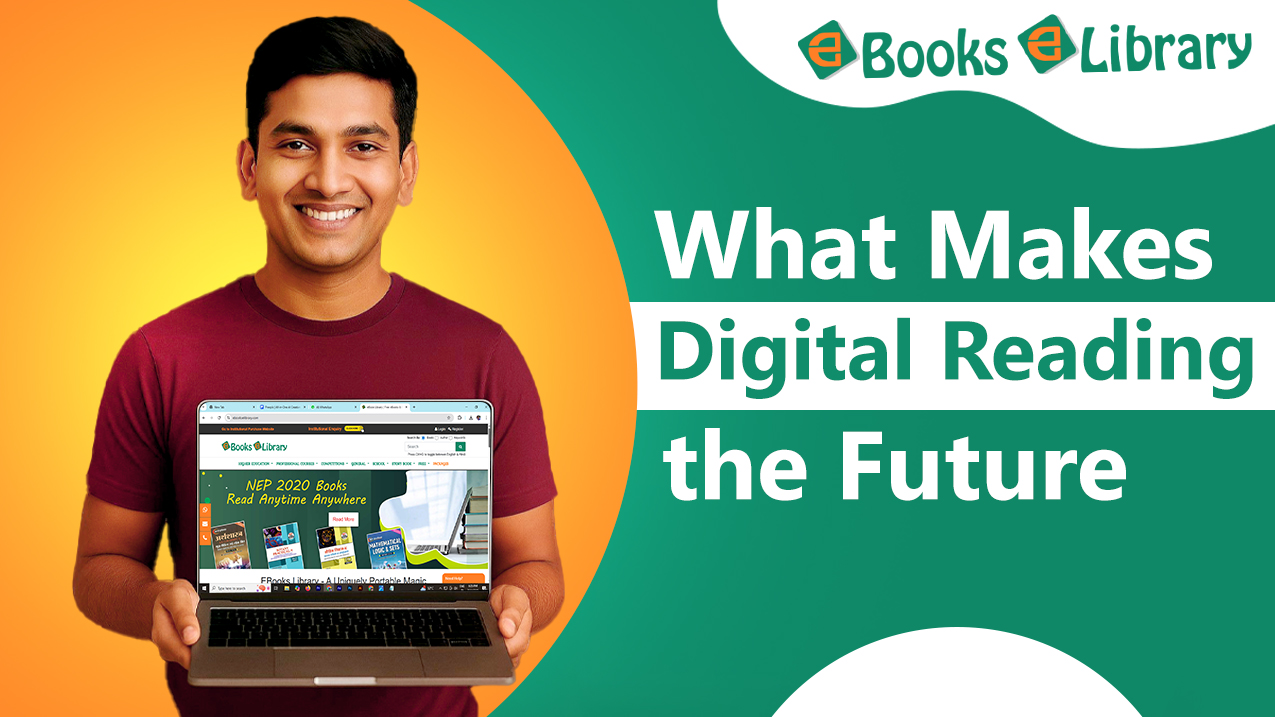
The digital age has transformed every facet of our lives, how we communicate, how we work, how we shop, and perhaps most significantly, how we consume information. Among the most notable shifts in recent years is the rising dominance of ebooks in the world of reading and publishing. A format that was once considered niche has now evolved into a fundamental element of contemporary education, literature, and research. With the availability of platforms like eBooks eLibrary, offering a diverse collection of textbooks, competitive exam materials, storybooks, and even free ebooks, readers around the globe are embracing the convenience and accessibility of digital reading.
In this article, we will explore the
reasons why ebooks are the future,
how platforms like an ebooks store
or ebooks library are
revolutionizing reading habits, and what this evolution means for students,
professionals, and avid readers alike.
The
Shift Toward Digital Reading
Understanding
the current state is crucial before exploring what lies ahead. The traditional publishing industry has faced numerous challenges
over the past decade, from rising printing costs to limited shelf space and
logistical issues. In contrast, ebooks
offer a seamless, cost-effective, and eco-friendly alternative that caters to
the fast-paced, mobile lifestyles of modern readers.
Whether it's a student preparing for
an entrance exam, a professional seeking self-improvement, or a parent looking
for engaging storybooks for their children, ebooks serve every reader's need without the limitations of
physical media.
Benefits
of eBooks: Why They Are Becoming the Norm
1.
Instant Access Anytime, Anywhere
Perhaps the biggest advantage of ebooks is the ability to access them
instantly from any device, laptop, smartphone, tablet, or e-reader. Unlike
physical books that require a trip to the bookstore or a wait for delivery, ebooks can be downloaded or read
online in seconds. An ebooks store
like eBooks eLibrary makes this process even more seamless by categorizing
books based on genre, academic level, or interest, making it easy to find
exactly what you're looking for.
2.
Portability and Convenience
Gone are the days when readers had
to carry multiple heavy books in their bags. You can keep a whole library of
ebooks on just one device. Whether you're traveling,
commuting, or studying in a café, your entire reading collection is just a tap
away.
3.
Cost-Effective and Affordable
Buying physical books can quickly
become expensive, especially for students and frequent readers. In contrast, ebooks are often priced lower due to
the absence of printing and shipping costs. Better yet, platforms like eBooks
eLibrary offer a free ebooks store
and even a free ebooks store online,
making knowledge accessible regardless of financial limitations.
4.
Environmentally Friendly
As the world becomes more conscious
of sustainability, ebooks offer
an eco-friendly solution by reducing paper usage, cutting down on carbon
emissions from shipping, and minimizing waste. Transitioning to a digital
reading model aligns with global efforts to reduce our environmental footprint.
5.
Customizable Reading Experience
One of the major perks of digital
reading is the level of personalization available. Readers can adjust font
size, background color, brightness, and even use audio features for a more
accessible reading experience. This flexibility makes ebooks particularly valuable for readers with visual impairments
or learning difficulties.
eBooks
and Education: A Perfect Match
The impact of ebooks on education is profound.
Academic institutions, educators, and students are increasingly relying on
digital resources for teaching and learning. Here's why:
1.
Up-to-Date Content
Unlike printed textbooks that may
become outdated within a few years, ebooks
can be updated regularly with new information. This guarantees learners can always
rely on the current and relevant educational content.
2. Interactive Features
Modern ebooks often include multimedia elements such as videos, quizzes,
and interactive graphs, which enhance learning outcomes. These features are
especially useful for complex subjects in higher education and competitive exam
preparation.
3.
Affordability for Students
Higher education can be financially
overwhelming. An ebooks store or
ebooks library offering
affordable or free ebooks can
significantly ease the burden. Students no longer need to spend thousands on
physical textbooks when digital versions are readily available—sometimes even
free.
4.
Remote Learning Compatibility
With the rise of online education, ebooks seamlessly integrate into
virtual classrooms. They enable remote access, allow for collaborative
annotations, and sync across devices, making them indispensable tools in modern
education.
The
Rise of the eBooks Store
Platforms like eBooks eLibrary
exemplify the growing trend of digital bookstores that cater to diverse reader
needs. These online hubs are more than just sales platforms—they serve as
full-fledged ebooks libraries,
offering both paid and free ebooks
across various genres and academic fields.
Whether you're interested in
fiction, non-fiction, exam guides, or reference materials, a well-curated ebooks store provides instant access
without the traditional constraints of physical bookstores.
Free
eBooks Store: Knowledge for Everyone
One of the most democratizing
aspects of the digital reading revolution is the emergence of the free ebooks store online. These
platforms provide open access to a vast array of books without any cost, making
learning and leisure reading accessible to everyone regardless of income or
geographic location.
For instance, eBooks eLibrary
includes a dedicated section for free
ebooks, covering everything from classic literature and academic
resources to contemporary fiction and children's books. This shift is
especially valuable in developing countries or remote areas where physical
books may be scarce or expensive.
Challenges
and How They’re Being Addressed
While the rise of ebooks offers numerous advantages,
it's not without its challenges. Some of these include:
1.
Digital Fatigue
Spending extended hours on screens
can cause eye strain and fatigue. To combat this, many ebooks now offer “dark mode” and adjustable brightness features,
while e-readers like Kindle use e-ink technology to mimic paper and reduce eye
strain.
2.
Lack of Physical Connection
Some readers still cherish the
tactile experience of holding a physical book. However, the convenience,
affordability, and interactivity of ebooks
often outweigh this sensory preference, especially for everyday use.
3.
Digital Divide
Not everyone has access to the
internet or digital devices. This is a legitimate concern, but as technology
becomes more affordable and internet access continues to expand, ebooks will become more accessible.
Free access points like libraries, schools, and community centers are also
helping to bridge this gap.
The
Role of eBooks Libraries in the Future
Just as public libraries
revolutionized literacy in the past century, ebooks libraries are doing the same in the digital age. These
platforms offer centralized access to thousands of titles, often organized by
subject, author, or academic level.
A modern ebooks library doesn’t just house books, it curates learning
journeys, recommends personalized reading lists, and allows users to share,
annotate, and discuss content in real time. They’re dynamic, living collections
tailored to the needs of the digital generation.
The
Future is Here: Embracing Digital Literacy
As we move deeper into the information age, digital literacy becomes as important as traditional literacy. Knowing how to access, evaluate, and utilize digital content is a key skill in the modern world. eBooks play a central role in this shift by fostering independent learning, curiosity, and critical thinking.
Platforms that function as an ebooks store or free ebooks store online are not just selling books, they’re building ecosystems of knowledge, creativity, and global learning.
The rise of ebooks is not just a trend, it’s a paradigm shift. With
unparalleled accessibility, affordability, and interactivity, ebooks are shaping the way we read,
learn, and grow. Platforms like eBooks eLibrary exemplify this transformation
by offering curated collections, free
ebooks, and a user-friendly digital environment.
Whether you’re a student, educator,
researcher, or casual reader, embracing the future of reading through ebooks is no longer optional, it’s
essential. From ebooks libraries
that host academic treasures to free
ebooks stores that open the doors of knowledge to everyone, the digital
reading revolution is here to stay.
And that’s why ebooks are the future.
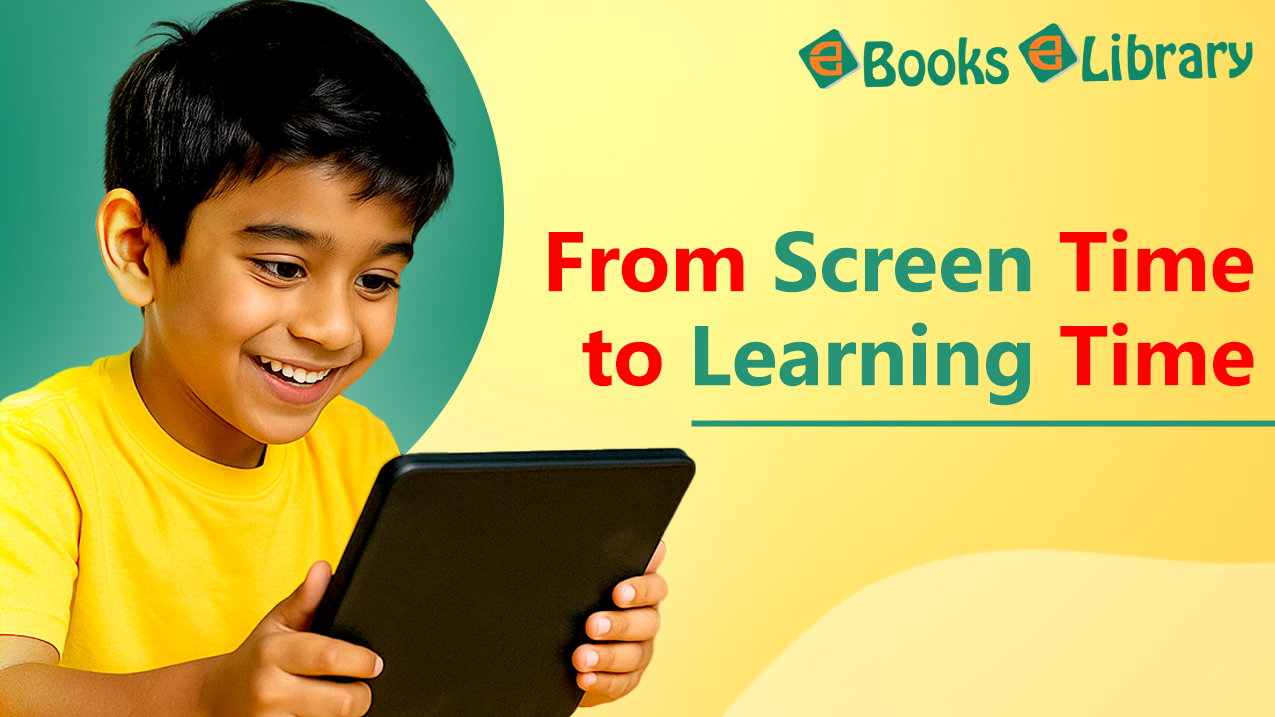
In the rapidly evolving digital age, screens have become an inseparable part of our daily lives. From online classrooms and educational apps to entertainment platforms and virtual playdates, children today are exposed to more screen time than any previous generation. While this trend has sparked debates over potential risks like screen addiction or decreased physical activity, it also presents unique opportunities, especially in the realm of education. One of the most promising developments is the rise of eBooks, offering a safe, enriching alternative to passive digital consumption.
Whether accessed through an ebooks library, a dedicated ebooks store, or a free ebooks store, eBooks provide
children with meaningful and stimulating learning experiences. When used
wisely, they can transform screen time from a concern into a valuable
educational asset.
The
Screen Time Dilemma: Harm or Opportunity?
Many parents and educators view
screen time with skepticism. Concerns typically revolve around:
However, not all screen time is
created equal. Experts now distinguish between passive and active
screen use:
· Passive screen time refers to
activities like watching videos or browsing social media where there is little
to no interaction or mental engagement.
· Active screen time involves mentally
stimulating or creative tasks, such as reading digital books, participating in
interactive educational tools, or working on problem-solving games online.
It’s clear that when screen time is
filled with stimulating and age-appropriate content, it can actually support
intellectual development. This is where eBooks shine.
Why
eBooks Are a Modern Learning Powerhouse
The emergence of eBooks has changed
the way children experience literature and storytelling. Digital reading not
only caters to modern habits but also enhances the traditional reading process
in several ways.
1.
Enhanced Reading Experience
Unlike printed books, eBooks often
include:
These tools are especially useful
for early readers, ESL learners, or children with learning challenges, helping
them grasp vocabulary, sentence structures, and pronunciation with ease.
2.
Portability and Convenience
Instead of carrying several books, a
single tablet or e-reader can host hundreds of titles. Whether traveling,
waiting at appointments, or lounging at home, a personal ebooks library can go wherever the child
goes, encouraging spontaneous reading habits.
3.
Multisensory Engagement
Children learn best when multiple
senses are engaged. eBooks incorporate:
This approach caters to various
learning styles and keeps kids more engaged than static text on a page.
4.
Accessibility and Personalization
Modern ebooks store platforms allow personalized features such as:
These enhancements make reading more
inclusive, offering tailored experiences to children of all learning abilities.
Educational
Benefits of eBooks for Children
They are essential in influencing a
child's mental and emotional growth.
Language
and Literacy Skills
eBooks help improve:
Interactive elements like read-aloud
narration and word-highlighting support early literacy and reinforce phonetic
learning.
Critical
Thinking and Creativity
Interactive eBooks with branching
storylines, puzzles, or choose-your-own-ending formats challenge children to:
This active participation boosts
problem-solving skills and nurtures creativity.
Independent
Learning
Children can explore subjects like
animals, science, history, or fantasy worlds on their own terms. With a vast
selection from a free ebooks store
or paid ebooks store, they can
cultivate a habit of curiosity-led, self-paced learning.
Cultural
and Social Awareness
A digital ebooks library often includes titles that reflect diverse
cultures, languages, and perspectives. This exposure helps build empathy and
cultural sensitivity from an early age—an essential skill in today's globalized
world.
How
to Ensure Safe and Productive eBook Use
While the benefits of eBooks are
vast, responsible use is crucial. Here are some tips for parents to ensure that
eBooks contribute positively to their child's development.
1.
Designate Purposeful Screen Time
Set specific times for reading from
the ebooks library, such as:
Structured routines prevent overuse
and reinforce reading as a valued activity.
2.
Co-Read and Discuss
Even as children grow older,
occasional co-reading sessions can:
3.
Select Age-Appropriate Content
Not every eBook is suitable for
every age. Look for:
Many free ebooks platforms categorize books by age, genre, or learning
objective, making the selection process easier.
4.
Monitor and Adjust Usage
Parents should observe how their
child reacts to specific eBooks:
Simple adjustments—like turning off
sound effects or choosing simpler stories—can ensure better focus and
comprehension.
These platforms offer tools for
parental controls, reading level suggestions, and downloadable options for
offline reading—making them ideal for both home and school use.
Balancing
Digital and Physical Reading
While eBooks bring convenience and
interactivity, physical books still have their place. Ideally, children should
have access to both formats. The tactile nature of paper books helps with fine
motor skills and creates a different kind of emotional bond. A balanced
approach might look like this:
Blending these methods provides a
well-rounded reading experience.
The
Future of Learning: Digital, Diverse, and Deliberate
We live in a time where technology
is not just influencing education—it is shaping it. As children grow up in this
digital-first world, the focus should not be on eliminating screen time, but on
guiding it with intention.
eBooks are a remarkable tool in this
journey. Whether found through a premium ebooks store or a free
ebooks store, they can offer knowledge, wonder, and inspiration. When
chosen wisely and used thoughtfully, eBooks transform screen time from a
passive activity into a powerful learning opportunity.
Read, Learn, Grow:
The Positive Side of Kids’ Screen Time
Instead of constantly worrying about
how long our kids are looking at screens, we should shift the conversation
toward what they’re seeing. Are
they being mindlessly entertained—or are they learning, imagining, and growing?
With thoughtfully curated titles
from platforms like Ebooks eLibrary,
screen time can become safe, productive, and even transformative. Access to a
rich ebooks library—be it free
or paid—means that quality learning is now just a click away.
So the next time your child reaches
for the tablet, consider steering them towards an engaging story, a fun
factbook, or a whimsical adventure from a free ebooks store. Because when screen time becomes reading time,
everybody wins.
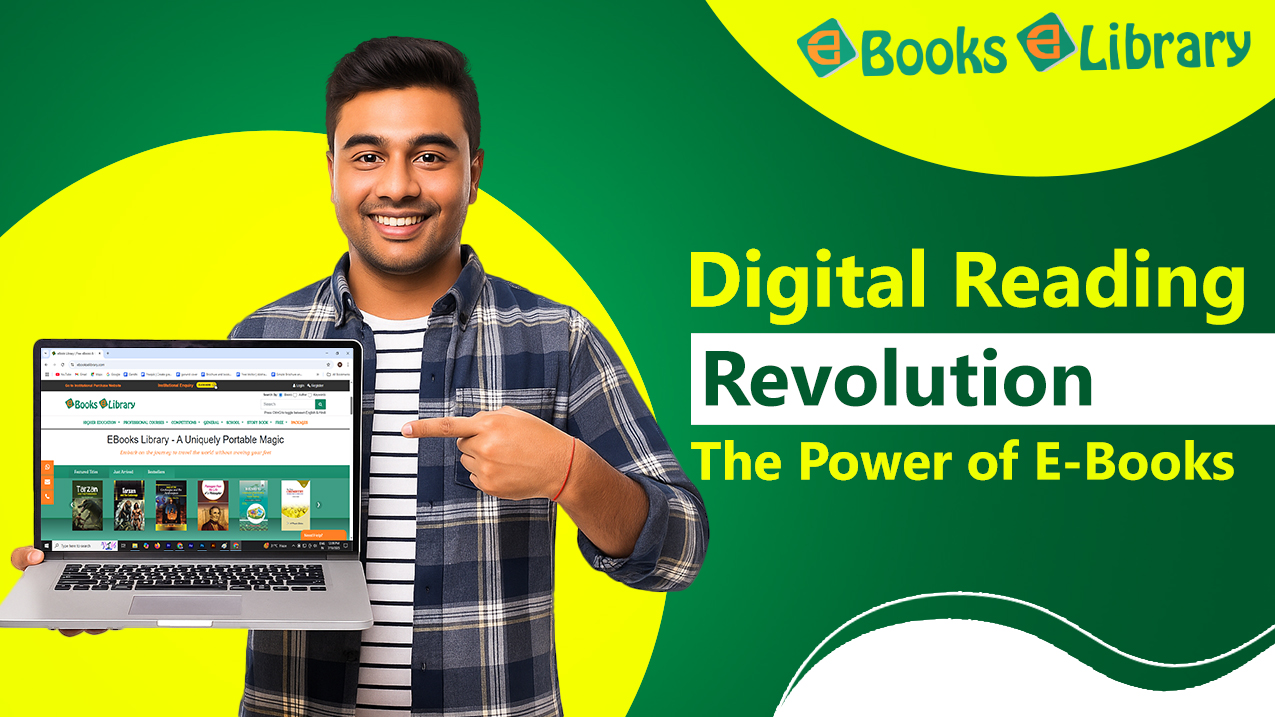
In a world increasingly driven by digital innovation, the way we read, learn, and engage with content is evolving rapidly. The shift from traditional hardcopy books to digital formats like eBooks has transformed reading into a more accessible, efficient, and personalized experience. From students preparing for competitive exams to casual readers diving into the latest novels, eBooks have carved a vital role in modern education and leisure.
Platforms like eBooks eLibrary have led this transformation,
offering an expansive collection that spans higher education, competitive
exams, story books, and even a dedicated section for free ebooks. Whether you are browsing through an ebooks store, searching for a comprehensive ebooks library, or seeking a free ebooks store online, digital reading has opened up a
world of benefits worth exploring.
Let’s dive into the most
compelling reasons why eBooks are redefining the way we read.
Imagine carrying an entire
library in your pocket. That’s the reality of reading eBooks today. Whether
you're commuting, relaxing on vacation, or studying at midnight, eBooks are
available 24/7 on your smartphone, tablet, or laptop.
Printed books require
physical handling and storage, making them less convenient in dynamic
environments. In contrast, an ebooks library lets you download your titles and access them without worrying about
damage, space, or availability. For today’s mobile lifestyle, portability is
king, and eBooks deliver it effortlessly.
The cost of education
continues to rise, with textbooks and reference materials becoming increasingly
expensive. eBooks help bridge this gap.
Digital publishing is significantly
cheaper than printing physical books. This cost-efficiency gets passed on to
the reader. On platforms like eBooks eLibrary, learners can find academic texts and guides at a fraction of the cost
of printed versions. Better yet, the free ebooks store section allows users to access high-quality books without paying a
single rupee or dollar.
For students, especially
those preparing for board exams, entrance tests, and university coursework,
this affordability can be a financial lifesaver.
Sustainability is no longer
optional, it’s essential. Traditional book publishing involves deforestation,
ink usage, and fossil fuel transportation. On the other hand, digital
books provide a more eco-friendly solution.
By accessing books through a
digital ebooks
store, you
contribute to reducing paper waste, carbon emissions, and deforestation.
Reading digitally doesn’t just benefit you, it benefits the planet.
How many times have you
flipped through a printed book trying to locate a particular quote or formula?
With eBooks, that frustration is eliminated.
The search functionality in
eBooks allows users to instantly locate specific words, phrases, or topics.
Digital textbooks often include clickable tables of contents, hyperlinks, and
bookmarks, enabling seamless navigation through even the longest of texts. This
is especially valuable for competitive exam prep, where time efficiency is
crucial.
Gone are the days when books
were limited to static words and images. Many modern eBooks, particularly those
on educational platforms like eBooks eLibrary, now come equipped with interactive elements such as:
·
Embedded
videos
·
Audio
explanations
·
Animated
diagrams
·
Clickable
quizzes
·
Instant
feedback tools
These multimedia features
make eBooks more engaging for visual and auditory learners. Complex
topics—especially in science and math, become easier to understand and remember
through digital enhancements.
No two readers are alike.
Some prefer large fonts, others need darker backgrounds. Printed books offer a
one-size-fits-all format. eBooks do the opposite.
eBooks let readers customize:
·
Font
size and style
·
Background
color (sepia, dark mode, etc.)
·
Line
spacing
·
Screen
brightness
This tailored approach
minimizes eye strain and allows for more comfortable long reading
sessions—ideal for students, professionals, and night readers.
Printed books, once
published, remain static. If an error is discovered or new information emerges,
a new edition must be printed and distributed. This often delays access to the
most accurate content.
On the other hand, eBooks can
be updated instantly. Whether it’s a revised syllabus, a new chapter, or a
corrected typo, the digital format allows publishers to deliver updates in
real-time. For learners who need to stay current, especially in fields like
technology, current affairs, or medicine, this is an invaluable advantage.
Taking notes in printed books
often involves sticky notes, highlighters, or margin scribbles. With eBooks,
everything is streamlined digitally.
eBooks allow you to:
·
Highlight
text
·
Make
digital notes
·
Bookmark
pages
·
Save
annotations
·
Export
your notes into PDFs
These tools make revising
easier and more efficient. Some eReaders even allow you to categorize notes by
topic or date—great for preparing for final exams or writing research papers.
Today’s readers often use multiple
devices throughout the day - a phone during the commute, a laptop at work or
school, and a tablet in bed.
Thanks to cloud syncing,
eBooks offer a seamless reading experience across devices. Your bookmarks,
last-read page, highlights, and notes travel with you. You can start reading a
novel on your phone during lunch and continue from the same page on your tablet
at night.
This syncing capability is a
must-have feature for modern readers.
Traditional books require significant
physical storage. Whether you’re a student storing academic texts or a
bibliophile with an ever-growing collection, bookshelves eventually run out of
space.
With eBooks, storage is
virtually limitless. You can store thousands of books - academic, fiction,
non-fiction, or children’s literature—on a single device or cloud account. A
well-organized ebooks
library ensures
quick access and zero clutter.
eBooks aren’t just
convenient, they’re inclusive.
With adjustable text sizes,
audio support, and text-to-speech functions, eBooks cater to readers with:
·
Visual
impairments
·
Dyslexia
·
Learning
disabilities
·
Limited
mobility
This has made reading more
accessible than ever. In a digital format, every reader—regardless of ability—has
an equal opportunity to learn and enjoy literature.
One of the most revolutionary
aspects of digital reading is the rise of free ebooks store online platforms. These platforms, like eBooks eLibrary, offer completely free access to
hundreds sometimes thousands of titles.
Free eBooks cover:
·
Academic
textbooks
·
Competitive
exam materials
·
Short
stories
·
Children’s
books
·
Self-help
guides
Whether you're a school
student, a job aspirant, or a lifelong learner, the free ebooks store model ensures that cost is no longer
a barrier to knowledge.
As digital reading grows,
curated platforms play a crucial role in making quality content accessible. eBooks eLibrary stands out by offering a thoughtfully
categorized collection that includes:
·
Higher
Education textbooks
·
Competitive
Exam preparation guides
·
Storybooks
for all age groups
·
Free
eBooks for general reading
It is more than just an ebooks store - it's a comprehensive ebooks library tailored to modern learners' needs.
Whether you want a practice paper for your board exams or a bedtime story for
your child, the platform delivers with ease.
The shift to digital reading
is not a trend—it’s a transformation. eBooks combine the richness of
traditional reading with the power of modern technology. They offer cost
savings, personalization, accessibility, and environmental benefits that
printed books simply can't match.
Whether you're a student,
teacher, parent, or casual reader, there's never been a better time to explore
the world of eBooks. With trusted platforms like eBooks eLibrary, you gain access to a high-quality ebooks store, a vast ebooks library, and even a free ebooks store online - all in one place.
Start your journey today and
experience the future of reading for yourself.
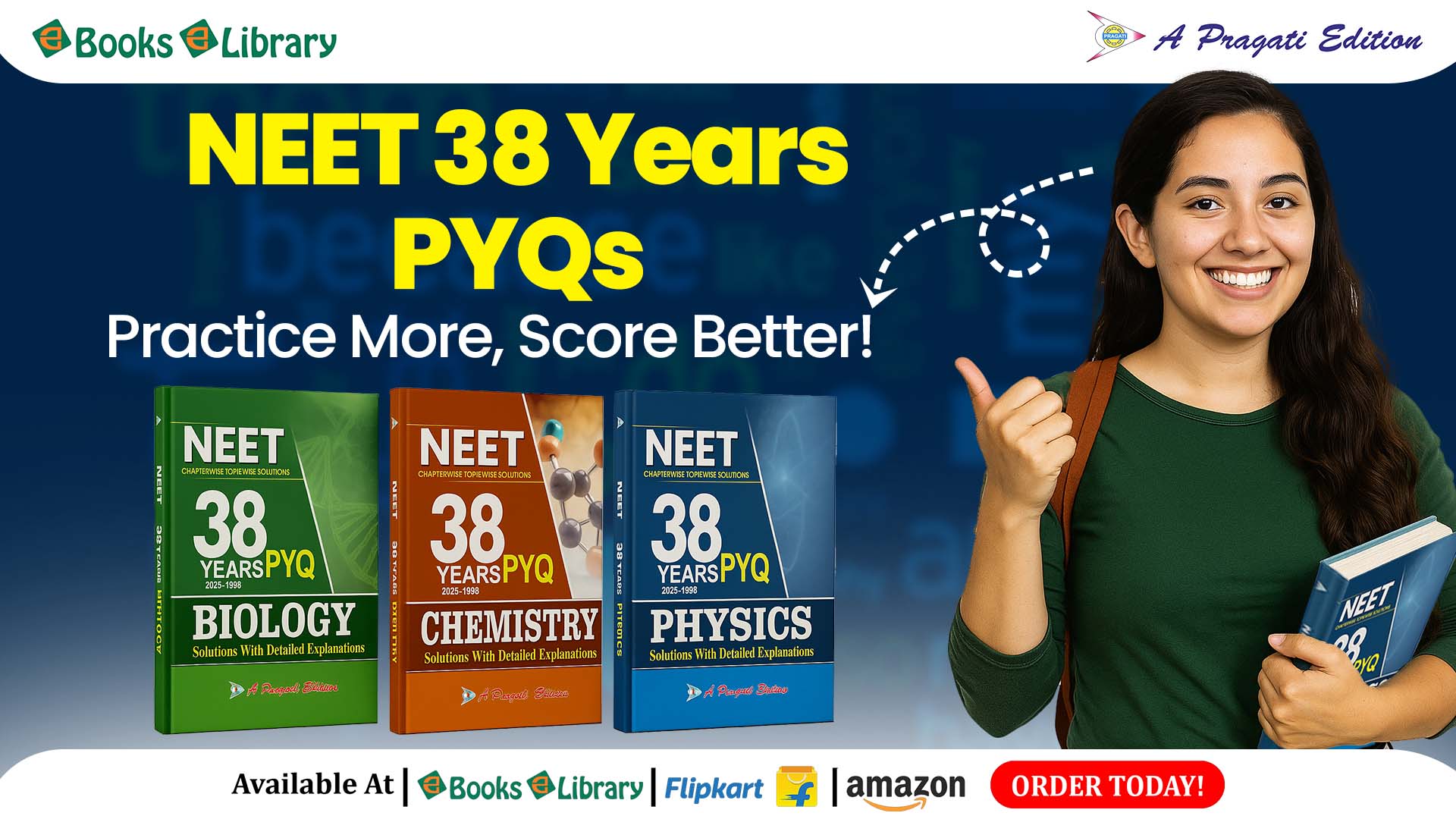
In today’s highly competitive environment, cracking the NEET exam requires more than just reading textbooks or attending coaching classes. It demands a well-structured preparation strategy, exposure to actual exam-level questions, and an understanding of the exam pattern over the years. One of the most trusted and effective ways to achieve this is by practicing NEET previous year solved papers.
At eBooks eLibrary, we understand the challenges NEET aspirants face
and strive to provide the best tools to support their journey. Our latest
offering 38 Years NEET PYQs for
Physics, Chemistry, and Biology - is designed with a singular aim: to
enhance the preparation of students by offering them access to real exam
questions from the past, complete with detailed solutions.
Whether you are looking for NEET ebooks, Neet study material, or printed books with home delivery, eBooks eLibrary is your go-to
platform. With a 50% discount and free delivery across India, students now have
an affordable, accessible, and reliable source to boost their NEET preparation.
Why
Practicing NEET PYQs is Crucial
Understanding the exam pattern, the
types of questions asked, and frequently tested concepts can make a significant
difference in your preparation. NEET
previous year question papers serve as a mirror of the actual exam,
helping aspirants adapt to the pattern and manage time effectively.
Key benefits of practicing NEET PYQs
include:
About
the 38 Years NEET PYQs Book Series
Our 38 Years NEET PYQs books for Physics, Chemistry,
and Biology are curated to offer
a one-stop solution for aspirants who aim to cover the past year questions in a
structured and effective manner.
Salient features of the book series:
Subjects
Covered
Who
Should Buy These Books?
Available
in Both Formats: eBooks and Print Books
At eBooks eLibrary, we cater to the preferences of all learners.
These NEET study material books are available in two convenient formats:
And the best part? You get 50% off plus free delivery anywhere
in India when you buy from eBooks
eLibrary. This makes quality NEET preparation affordable for all.
Why
Choose eBooks eLibrary?
1. Trusted Platform
We are a dedicated hub for a wide range of study resources — from higher
education and competitive exam guides to fiction, non-fiction, and free eBooks.
2. Tailored for NEET Preparation
Our NEET PYQs books are curated by experts who understand the exam pattern and
the learning needs of students.
3. Affordable & Accessible
With massive discounts and free delivery, we ensure that cost is never a
barrier for learning.
4. Genuine Content
We take pride in offering verified, original, and plagiarism-free content that
adds real value to your preparation.
5. Easy Navigation
Our platform is user-friendly and allows students to search, preview, and buy
books effortlessly.
How
to Order
Ordering from eBooks eLibrary is
simple:
Cracking NEET is not just about hard
work - it’s about smart work. Practicing from NEET previous year question papers gives you the edge to approach
the exam with confidence and precision. The 38 Years NEET PYQs series by eBooks eLibrary is more than just a
question bank; it’s a powerful tool to shape your preparation journey.
Whether you’re just starting out or
in the final stages of your revision, make these books a part of your study
routine. Choose the best NEET study
material, and let every solved paper bring you one step closer to your
dream of becoming a doctor.
Start today. Practice smart. Succeed
with confidence.
Buy NEET
PYQs from eBooks eLibrary and unlock the potential of 38 years of exam insight
- all at half the price, delivered free to your door.